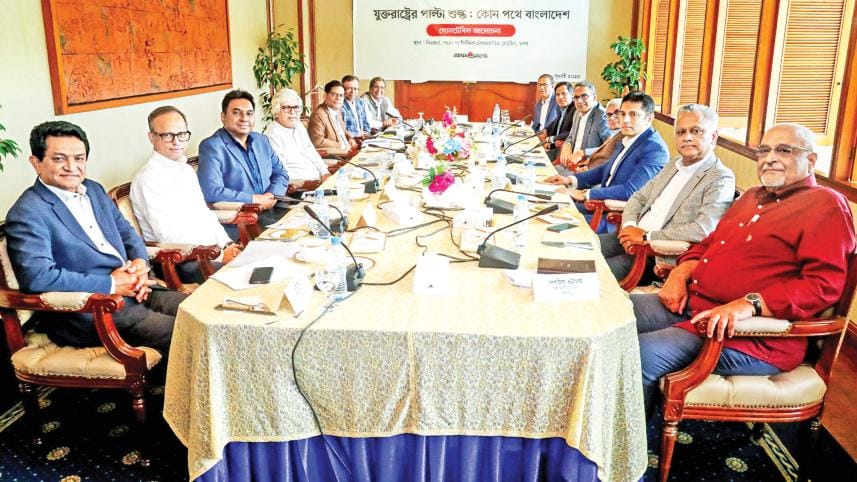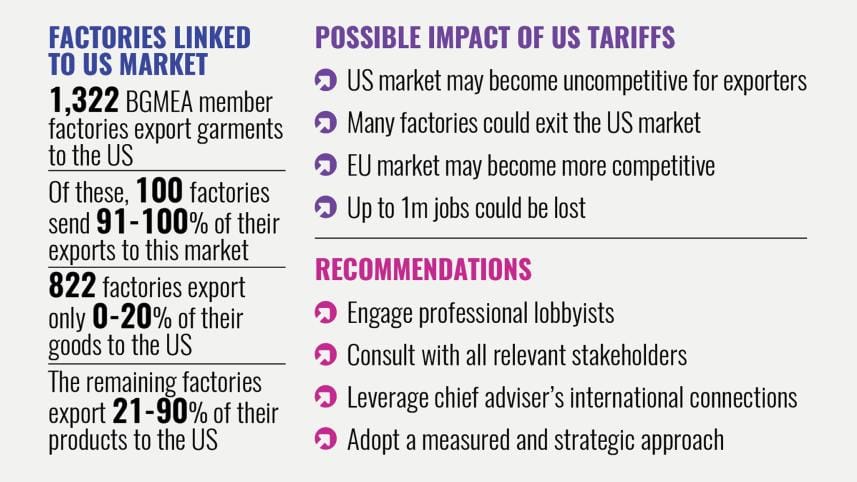Frustrated, businesses move to hire lobbyist to cushion US tariffs

Top business leaders have expressed frustration over the government's progress in negotiations with the United States on reciprocal tariffs, saying they are now working to appoint a lobbyist on their own, though doubts remain about whether this last-ditch effort will succeed.
Speaking at a roundtable in Dhaka yesterday, Mahmud Hasan Khan, president of the Bangladesh Garment Manufacturers and Exporters Association (BGMEA), said the government had earlier assured them that discussions with the United States Trade Representative (USTR) were going in Bangladesh's favour.

But it has become somewhat clear to the authorities recently that the final decision will come from the Trump administration, not from the USTR, he commented.
"Why did it take so long for the government to understand this?" Khan raised the question at the dialogue titled "US Retaliatory Tariffs: Which Way Bangladesh Is Heading?".
The event was organised by national daily Prothom Alo at the Pan Pacific Sonargaon Dhaka and brought together leading business figures, economists, and researchers.
The BGMEA president said that if exporters had been made aware of this situation earlier, they could have begun the process of hiring a lobbyist sooner.
"Now, we are trying to appoint a lobbyist. But we are getting limited responses because most are already engaged by other countries."
Bangladeshi goods had been entering the US market with an average duty of around 15 percent until the US administration announced a 37 percent reciprocal tariff. After a 90-day pause on the new rate taking effect, President Donald Trump revised the duty to 35 percent, set to take effect from August 1 unless Dhaka can negotiate a better trade deal.
The new tariff rattles local exporters, especially the apparel-makers, as the US market is the largest single-country destination for "Made in Bangladesh" clothing.
The BGMEA president said that 1,322 of their member factories export to the US. Of them, 100 send 91 to 100 percent of their garments to the American market, while 822 ship just up to 20 percent there.
Now, with the tariff deadline just around the corner, Khan said these factories run on razor-thin profit
Frustrated, businesses move to hire lobbyist to cushion US tariffs
margins, between 1.2 and 1.5 percent.
Even a 10 percent tariff could still be bearable, according to him, provided that the US does not offer lower tariffs to Bangladesh's competitors such as India, Vietnam, and Indonesia.
"If it goes above 20 percent, many factories will not survive," he warned, adding that the government had kept the private sector out of the negotiation process.
"Unless the tug-of-war within the bureaucracy [indicating the commerce, finance, and foreign ministries] ends, the private sector will not be able to move forward. We need to negotiate smartly on these retaliatory tariffs," he said.
AK Azad, a prominent exporter to the American market, said he had never seen such uncertainty in his four decades of doing business with the US.
"I was convinced Bangladesh would secure a moderate tariff. However, one of my major buyers recently informed me that the outcome will not be as expected. Buyers are already asking how much of the tariff burden we can absorb," Azad said.
Commenting on the duration of the interim government, Azad asked, "After seven to eight months you will leave, but where will we go then?"
"There is a general perception that someone above us will blow a magic breath and all problems will be solved. That is why we are not being properly evaluated, and no one is even considering appointing a lobbyist," he added.
The government on Saturday said that tariff rates would be decided by the Trump administration, not the USTR.
Addressing the government directly, Azad urged, "If you can, try to make some effort at that level."
Although the government claimed that steps had already been taken quickly, including the appointment of lobbyists, Azad remained unconvinced. "We do not even know how far we can go by appointing lobbyists now," he said.
Debapriya Bhattacharya, a noted economist of Bangladesh, criticised the interim government for signing a non-disclosure agreement (NDA) with the US during the tariff talks.
"By signing a non-disclosure agreement, the government opted for obligation over responsibility," said Bhattacharya.
He noted that no partner country had ever provided an NDA document in Bangladesh's history. A non-paper, an informal document without legal force, would have sufficed and conveyed responsibility without binding commitments, he added.
"Under this agreement, even if Bangladesh appoints a lobbyist, the information cannot be shared with them," said Bhattacharya, a distinguished fellow at local think tank Centre for Policy Dialogue (CPD).
He said meaningful trade negotiations require an understanding of the partner country's economic outlook.
"The US economy is gradually losing competitiveness and facing twin deficits -- current account and fiscal. The tariff move aims to cut imports, boost domestic investment, and create jobs. But Trump's assumption is unscientific and unsustainable," he said.
Bhattacharya predicted that inflation in the US would rise and that the impact of tariffs would become more visible ahead of the 2026 midterm elections.
He criticised the interim government for sidelining stakeholders and experts throughout the process.
Trade in services, which currently benefits the US, should have been part of the conversation, he argued. At the same time, he urged urgent domestic reforms, including export diversification, productivity gains, and stronger institutions.
"There is no instance where a weak and uncoordinated government successfully negotiated a major trade deal," he said. "Given its lack of political legitimacy, this government should have involved stakeholders from the outset."
Taking a swipe at the government's handling of the situation, Bhattacharya said, "We are moving forward with an innocent, naive government in muddy lands."
Sharif Zahir, managing director of Ananta Group, said, "We have miserably failed diplomatically to reduce the reciprocal tariff of the US, but still 10 days remain, so we should use every possible way, including the Chief Adviser's connection, to reduce it."
If tariffs remain high, US-centric firms may not survive six months, he warned. "More than 10 lakh people will lose their jobs."
Former finance secretary Mahbub Ahmed acknowledged the government's weak negotiating capacity and called for the inclusion of civil society, experts, and business chambers in the process.
He recalled that similar fears had emerged in the past during the move to a quota-free regime and over the child labour issue. "But the local apparel industry was not destroyed. In fact, it flourished," he said.
Other speakers at the event included Professor Mustafizur Rahman, distinguished fellow of the CPD; Selim Raihan, economics professor at Dhaka University; Syed Nasim Manzur, managing director of Apex Footwear; and Anwar-Ul-Alam Chowdhury, former president of the BGMEA.



 For all latest news, follow The Daily Star's Google News channel.
For all latest news, follow The Daily Star's Google News channel.
Comments